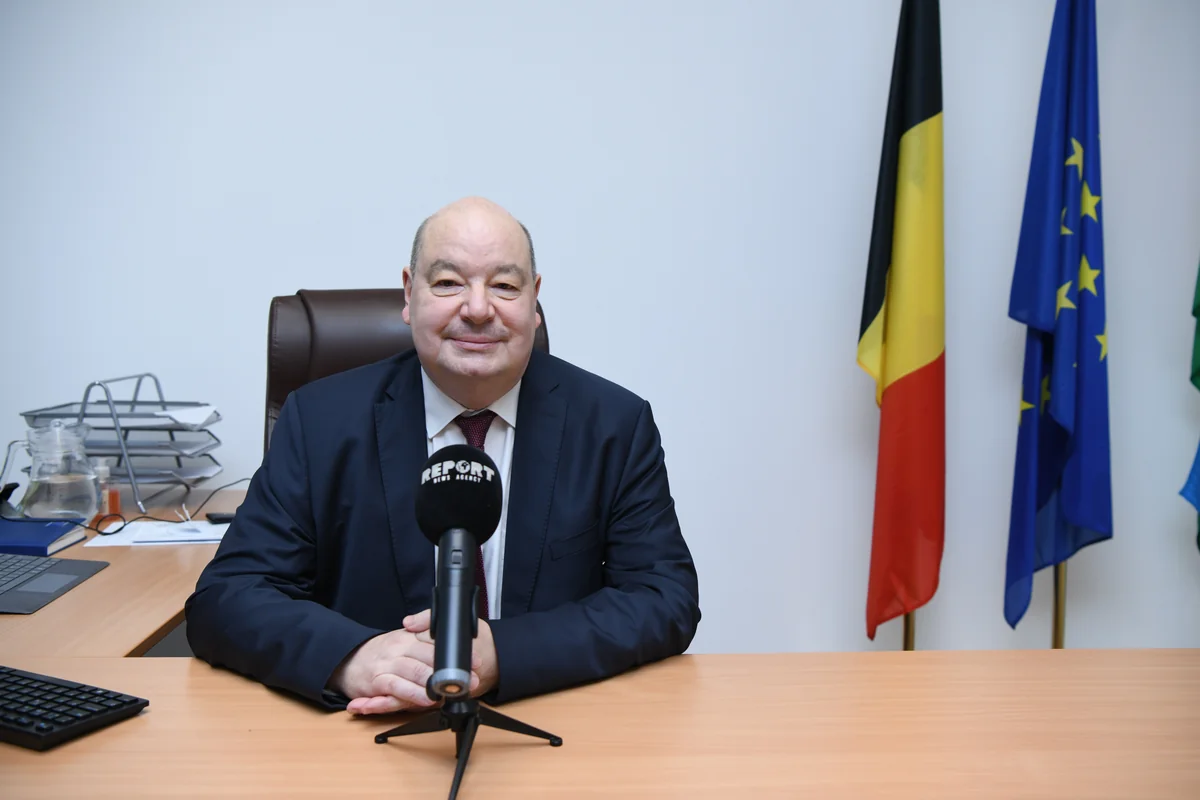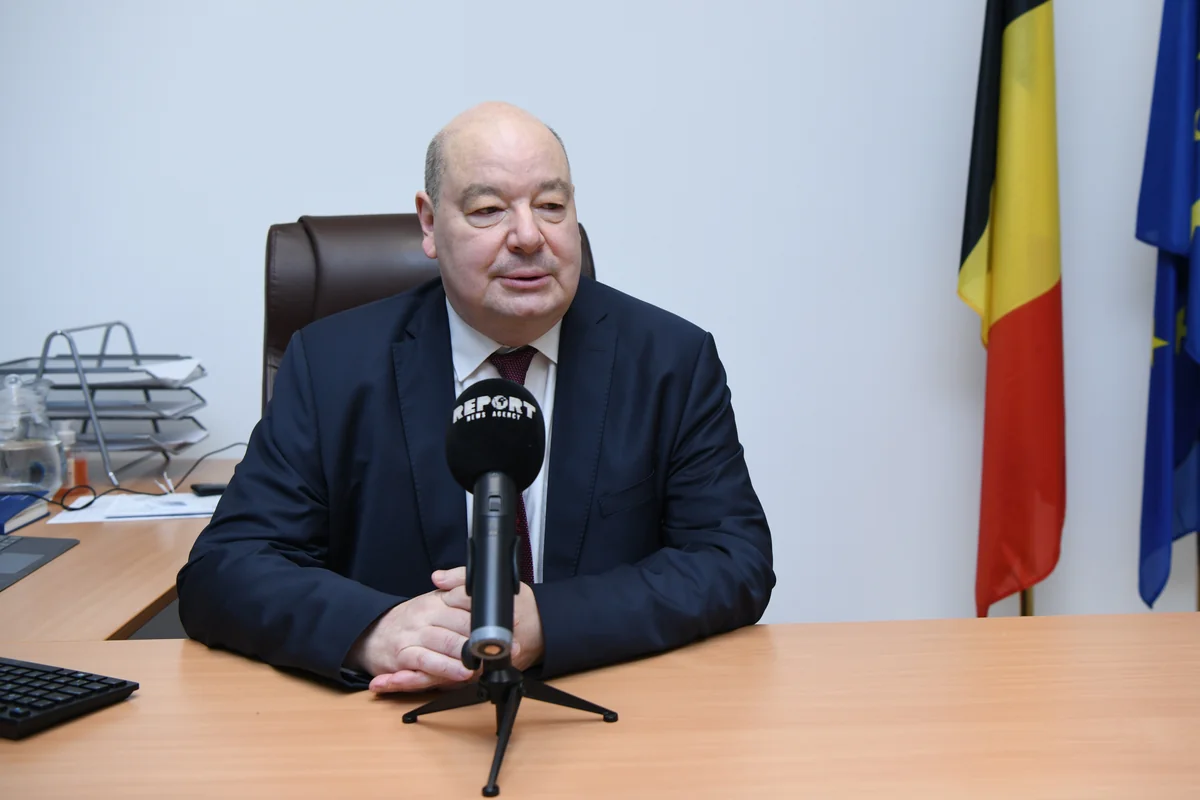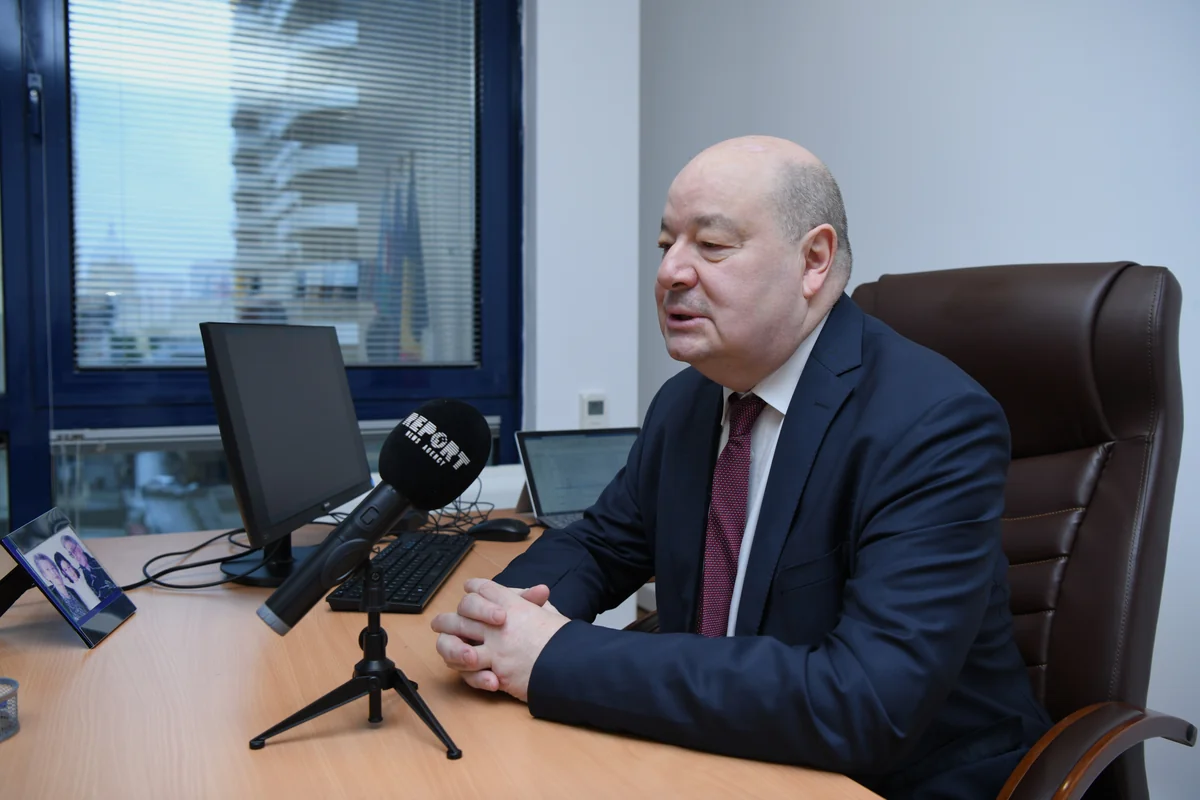Envoy: Belgium helping Azerbaijan solve serious problem - clearing Karabakh from mines
- 31 May, 2024
- 08:38

Diplomatic relations between Azerbaijan and Belgium were established on June 17, 1992. In 1995, the Azerbaijani embassy was opened in Belgium. Active cooperation has been established between the countries in the trade and economic sphere, education, and there are also opportunities to strengthen cooperation in the energy sector, in particular in renewable energy sources.
Report presents an interview with Ambassador of Belgium to Azerbaijan Michel Peetermans, who will complete his diplomatic mission in the country this summer.
- This summer you are completing your diplomatic activities in our country, what will you remember most about Azerbaijan?
- The South Caucasus region has always attracted my attention. I heard about the beauty of the city of Baku long before I came here. Baku has great architectural wealth, presented in various styles.
The old town, buildings of the 19th and 20th centuries, the construction of which accompanied the development of the city associated with the oil industry, coexist harmoniously with each other. I would especially like to note the museum house of the Baku philanthropist Haji Zeynalabdin Tagiyev, which I visited with great pleasure.
Baku is also famous for its achievements in the Art Nouveau style. Here we must pay tribute to the influence of modern architects who have changed the appearance of Baku; the Heydar Aliyev Center and the Flame Towers complex stand out in particular.
I would also like to mention traditional Azerbaijani music. I discovered the depth of your music after first discovering it in Astana during the International Exhibition in 2017. Baku also has a musical reputation for its jazz clubs and festivals. Moreover, Azerbaijani composers of the 20th century really deserve more attention from the Belgian and European public.
As an opera composer, Uzeyir Hajibayov is undoubtedly the most famous. One cannot help but be inspired by his style, which harmoniously combines various influences. I still remember a puppet theater performance inspired by the work “Layla and Majnun” - the Azerbaijani version of the Babylonian myth “Pyramus and Thisbe”, or “Romeo and Juliet.”
I would also like to mention Fikrat Amirov and Gara Garayev, who left behind a wonderful instrumental legacy.

Azerbaijan is also famous for its artists and writers. It has been a true pleasure and honor for me to meet and develop friendships with creative individuals from various disciplines.
In general, Baku is a very lively city with many restaurants. Like the Belgians, Azerbaijanis love to spend time in cozy establishments and enjoy delicious food. Although Brussels, a city with high international activity, offers a wide range of culinary delights, Azerbaijani and Georgian cuisines (I am also accredited to Georgia) are not yet widely represented. For me, it was an opportunity to discover new culinary horizons.
- Could please you elaborate on how bilateral relations between our countries developed during your diplomatic activities?
- At the political level, dialogue between our leaders and administrations has continued over the past three years, even as direct contact was reduced due to the COVID-19 outbreak.
For example, on September 8, 2021, in Vienna, the presidents of the Belgian Chamber of Representatives and Senate, Eliane Tillieux and Stephanie D’Hose, met with their Azerbaijani counterpart Sahiba Gafarova.
Bilateral political consultations are held every two years. In April 2022, they took place in Brussels between delegations led by Khalaf Khalafov, who at that time served as deputy foreign minister of Azerbaijan, and Director General for Bilateral Relations of the Belgian Foreign Ministry Jeroen Koreman. The next meeting is expected to be in Baku in the second half of this year.
On September 23, 2022, on the sidelines of the UN General Assembly, bilateral negotiations were held between the foreign ministers of the two countries, Hadja Lahbib and Jeyhun Bayramov. On August 24 and 25, 2023, the head of the Belgian Foreign Ministry, Hadja Lahbib, was on an official visit to Baku. This provided an opportunity to discuss a wide range of topics with various interlocutors, including Foreign Minister Jeyhun Bayramov, Speaker of Parliament Sahiba Gafarova and religious leaders of Azerbaijan. This was a high point in our relations, since the previous visit by the Belgian foreign minister was dated 2015.
During the last meeting, one of the issues was the mine problem in the regions, over which Azerbaijan regained control in 2020. It is obvious that mine contamination is an obstacle to the return of people to previously occupied areas and the gradual restoration of their former normal life. Minister Lahbib expressed her readiness to consider Belgium's possible contribution to solving this problem. Belgium is one of the countries at the forefront of international commitments to ban landmines.

The Belgian government hosted an International Conference for a Global Ban on Anti-Personnel Mines. The Brussels Declaration adopted on this occasion led to the signing in September 1997 in Ottawa of the Convention on the Prohibition of the Use, Stockpiling, Production and Transfer of Anti-Personnel Mines and on their Destruction.
Statements made by Foreign Minister Lahbib in Baku recently became a reality. A contribution of 250,000 euros was provided by the Belgian NGO APOPO (Anti-Persoonsmijnen Ontmijnende Product Ontwikkeling, which translates as “Anti-Personnel Landmines Detection Product Development”), which operates in Aghdam and Tartar in partnership with MAG (Mines Advisory Group) to implement the project of the United Nations Development Program (UNDP).
APOPO was integrated into the project by its partners with the aim of providing innovative working methods that will accelerate soil disinfection. The project is carried out by a team of 20 people together with 20 sappers and sapper animals.
The grant will enable APOPO to continue its activities this year to locate, clear and secure at least 1,130,000 square meters of landmine-affected areas.
The Belgian contribution is part of the wider Team Europe initiative. The EU countries together form the largest international donor to mine clearance in Azerbaijan, providing approximately 10 million euros in grant assistance since 2020 to support humanitarian demining in previously occupied areas of the country. EU support is expected to amount to around 13 million euros this year and further funds are expected to be allocated for this purpose in the coming years.
Cultural and interpersonal relationships are also of great importance. In 2022 and 2023, the embassy organized concerts by two very different Belgian duos: Schntzl (whose music is inspired by jazz, but with influences from classical music, electronic music, minimalism) and Laterna Magica (baroque flutes). Flutists conducted master classes at the Azerbaijan National Conservatory and the Baku Music Academy.
Frankly, this is my favorite part of my job: connecting people through culture. Fortunately, these cultural contacts are not limited solely to embassy activities, and I hope that exchanges can also take place through individual initiatives.
Although the embassy in Baku does not issue visas, we try, within our competence, to facilitate procedures for young Azerbaijanis wishing to study in Belgium. We are also keen to keep in touch with former students, who I hope to invite to a reception at the residence before leaving.
The Azerbaijani Embassy in Brussels also plays a significant role in the development of our bilateral relations. In cooperation with AZPROMO and regional export promotion agencies, a networking event between Belgian and Azerbaijani companies will be organized in Brussels at the end of May. I also maintain constant contact with Ambassador Vagif Sadigov, whose determination and dynamism are known to everyone.
- How do you see the prospects for the development of cooperation between Belgium and Azerbaijan in the coming years?
- In the near future, of course, the issue of preparation for the 29th session of the Conference of the Parties to the UN Framework Convention on Climate Change (COP29) will dominate. This event will give impetus to political relations between Azerbaijan and all countries participating in the conference in the fight against climate change. Therefore, this will be a great moment for Azerbaijani diplomacy. At the same time, this is an opportunity for Azerbaijan to express itself to international companies, which, of course, will be widely represented in Baku.

In this sense, the Conference of the Parties will not only be a step towards achieving climate goals, but also a showcase for Azerbaijan, which is engaged in the process of reducing dependence on fossil fuels and diversifying the structure of its economy.
Of course, it is in the interests of Belgian companies not to limit themselves to the local or even the European market. If conditions allow, they are looking for contracts and locations around the world, including Azerbaijan.
The Belgian industrial chain is very diverse; the majority of Belgian companies are innovative and highly competitive SMEs. The authorities of my country have identified the energy and hydrogen transition, aerospace industry, biopharmaceuticals and life sciences, nuclear medicine, transport and logistics, as well as the development of digital industries (microelectronics/artificial intelligence/digitalization) as priority areas. The Belgian departments responsible for foreign trade are, of course, closely monitoring what is happening in the region. One of the three sales representatives, whose offices are located in Istanbul, has already visited Baku in May, and the other will arrive in June.
It is also important that the regulatory framework for export and investment in your country provides companies with maximum guarantees. This is especially true for small and medium-sized enterprises. The signing of a framework agreement between the EU and Azerbaijan, which has been under negotiation for several years, would be a very positive signal for European companies in this regard.
For Azerbaijan, as for all countries in the region, water resource management and international cooperation in this area pose a serious challenge. Various Belgian companies have experience and know-how. Thanks to the investments we have made, the water quality in Belgian rivers has improved significantly. Belgian experts, for example, have shared their experiences with the Baku port to enable it to move towards carbon neutrality.

- How do you assess the latest steps in the process of normalizing relations between Azerbaijan and Armenia?
- I began my work as Ambassador after the end of the Second Karabakh War, and therefore I was able to appreciate the efforts made by the EU and, in particular, by the president of the European Council, Charles Michel, to bring together points of view and move forward towards a just and lasting peace in accordance with the principles of international law.
This position was confirmed by Belgian Foreign Minister Hadja Lahbib during her visit to Baku in August 2023. In recent weeks, we have noted that some progress has been made in the bilateral dialogue between Azerbaijan and Armenia, which we welcome.
We hope that this process will be completed, and the countries of the region will have the opportunity to work together, including by improving international communications and energy transportation routes. This is in the interests of everyone, but especially the three countries of the South Caucasus. A framework that ensures peace in the region will promote economic development, create jobs and attract international investors.
- Are high-ranking officials from your country planning to participate in COP29? Could you please tell us about Belgium's participation in COP29?
- The official Belgian delegation should consist of about sixty people. Competences according to Belgian law are divided between the federal and regional levels (political representatives and civil servants). Parliamentarians and businesses will also be represented, as well as NGOs who traditionally attend the Conference of the Parties to present their views.

Since federal and regional elections will take place in Belgium on June 9, 2024, at the same time as the European Parliament elections, a decision on Belgium’s representation at government level has not yet been made, but it can be expected that my country will be represented at a high level, given the importance of the event.
One of the issues attracting the attention of the Belgian authorities is the integration of a just transition within the Nationally Determined Contributions (NDCs), especially for the most vulnerable countries. Belgium is a member of the Coalition of Finance Ministers for Climate Action, created with the support of the World Bank. The finance ministers of the coalition countries have made a political commitment to upholding the Helsinki Principles to ensure consistency between economic and fiscal policies and practices, on the one hand, and implementation of the commitments to the Paris Agreement, on the other.
It is too early to talk about specific plans, but the organization of events for the Conference of the Parties is being considered. Together with its Dutch and Luxembourg partners, Belgium will be located in the Benelux Pavilion for the duration of the Conference.
I would also like to take this opportunity to remind you that representatives of Belgium took part in the event “Opportunities and challenges for climate action. European and regional perspectives” at the ADA University on May 22, 2024.
